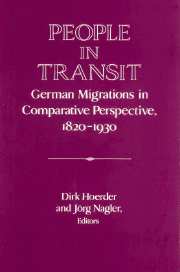Book contents
- Frontmatter
- Introduction
- PART I CONTINUITY AND COMPLEXITY: MIGRATIONS FROM EAST ELBIAN GERMANY AND GALICIAN POLAND
- Part II Internal German Migrations and In-Migrations
- PART III WOMEN'S MIGRATION: LABOR AND MARRIAGE MARKETS
- PART IV ACCULTURATION IN AND RETURN FROM THE UNITED STATES
- 18 Migration Past and Present - The German Experience
- 19 Research on the German Migrations, 1820s to 1930s: A Report on the State of German Scholarship
- Index
19 - Research on the German Migrations, 1820s to 1930s: A Report on the State of German Scholarship
Published online by Cambridge University Press: 05 January 2013
- Frontmatter
- Introduction
- PART I CONTINUITY AND COMPLEXITY: MIGRATIONS FROM EAST ELBIAN GERMANY AND GALICIAN POLAND
- Part II Internal German Migrations and In-Migrations
- PART III WOMEN'S MIGRATION: LABOR AND MARRIAGE MARKETS
- PART IV ACCULTURATION IN AND RETURN FROM THE UNITED STATES
- 18 Migration Past and Present - The German Experience
- 19 Research on the German Migrations, 1820s to 1930s: A Report on the State of German Scholarship
- Index
Summary
German researchers of emigration received their first organizational support in 1977 at a conference in Stuttgart. At this meeting, scholars already active in the field met together with interested librarians and archivists. Peter Marschalck's general survey of German emigration, Wolfgang Helbich's survey of German emigration to the United States, and a third survey of immigration to and emigration from Germany since 1880 provide starting points for research and teaching. In 1982, Klaus J. Bade organized a major symposium on emigration, migrant labor, and labor migrants in the context of demography and labor market theory. This methodologically broad, interdisciplinary approach established a model for migration research by going beyond the confines of social history and by linking empirically the different forms of migration. Since that time, five larger research projects have advanced knowledge on German migration to North America.
Begun at the University of Hamburg under the direction of Günter Moltmann, the first project aimed to write a social history of German emigration to North America. It dealt with themes as diverse as Germans in New York, “Little Germanies,” Germans and the frontier, Americanization, and the culture of emigration in Germany. Researchers paid especially close attention to places of origin. They raised questions about how the notion of emigration spread in southwestern Germany, to what degree convicts were transported, and how emigrants were recruited. One research topic, including eastern European transit migration and the emigrant aid societies, concerned the voyage from the place of origin via the two large German emigration ports, Hamburg and Bremen. However, this project placed little emphasis on gender and class. Other scholars addressed similar questions and used similar approaches, while concentrating on emigration, from southwestern Germany and from Schleswig-Holstein, and the depiction of emigration in popular German literature in the nineteenth century. Many of these studies have been published and the late Giinter Moltmann was editor of the series Von Deutschland nach Amerika. More recently, the desire to include all types of in- and out-migration induced Klaus J. Bade to plan a second series.
- Type
- Chapter
- Information
- People in TransitGerman Migrations in Comparative Perspective, 1820–1930, pp. 413 - 422Publisher: Cambridge University PressPrint publication year: 1995



